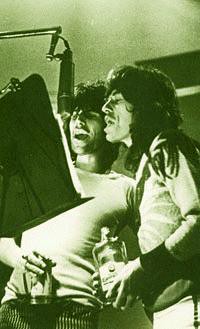From the Chippewa on Down: Fisking a Dirge
Cross post from Newcritics...

“Does anyone know where the love of God goes...?” I’ve had that unattributed lyric in my head for over thirty years. Many times I’ve sat down in attempt to scribe a few words for a riff I’ve come up with, and that lyric has found a way to the surface time and time again. I always knew it was someone else’s so I never tossed it out there while collaborating with others. I’d always had a sense that it was a partial bit too. It would still be a mystery if it wasn’t for an archived Rhino podcast of the Lefsetz Letter I tuned into recently that blew the lid off the mystery and all the pieces fell into place as I instantly remembered where I had first heard it and why it stayed with me all these years.
The words come following the denouement of the song. The instruments drop to a sparse hush, the snare drum reverberating in the distance, and then this…
Does any one know where the love of God goes
When the waves turn the minutes to hours?
The searches all say they'd have made Whitefish Bay
If they'd put fifteen more miles behind her.
They might have split up or they might have capsized;
May have broke deep and took water.
And all that remains is the faces and the names
Of the wives and the sons and the daughters.
These words are of course from just one of the seven verses of the Gordon Lightfoot hit The Wreck of the Edmund Fitzgerald the tale of an American freighter that sank in an early winter gale on Lake Superior in 1975 with twenty-nine crew on board.
I first heard it during one of our family’s long drives to our grandparent’s house in North Carolina sometime in 1976. Five kids, my parents, and a big dog all packed into a green Chevy station wagon that could fall apart at any moment. I was 12 years old. It was late in the evening and my brother and I were stretched out in the back and my head was right up against the mono radio speaker. My dad had the radio on and a DJ spun The Wreck of the Edmund Fitzgerald. I listened to every word and was filled with such sadness when it was over, especially after my folks told me that the story was true. This song is probably responsible for my life long affinity for dirges.
Wikipedia has this definition, which is a good start, but I stretch it to include the ability to be sung when drunk, and the lack of a definitive chorus. Its melody should memorable enough for listeners to actually want to hear the story being told. While some damn fine dirges have been written all over the world, the Irish seem to have a zest for them having written so many great ones, Arthur MacBride and Foggy Dew being two examples and a couple of my personal favorites (If I didn’t read that Lightfoot was a born and raised Canadian, I’d swear he had Erin blood running through his veins after hearing his Edmund Fitzgerald tale).
The story of Arthur McBride as he and his cousin go for a stroll on a Christmas day and end up crossing paths with a British Sergeant out looking for conscripts…
"But ", says Arthur, "I wouldn't be proud of your clothes
For you've only the lend of them as I suppose
And you dare not change them one night, for you know
If you do you'll be flogged in the morning.
And although that we are single and free
we take great delight in our own company
And we have no desire strange faces to see
Although that your offers are charming
And we have no desire to take your advance
All hazards and dangers we barter on chance
For you would have no scruples for to send us to France
Where we would get shot without warning "
Arthur is clearly not one for serving in the King’s army and his taunts do nothing but anger the sergeant. I’ll let you discover the outcome on your own.
The subject of these songs are often unsung hero’s or soldiers. From Foggy Dew (Check out Sinead O’Connor with the Chieftains for a haunting version of it)…
'Twas down the glen one Easter morn to a city fair rode I
There are Ireland's lines of marching men in squadrons pass me by
No pipe did hum; no battle drum did sound its loud tattoo
But the angelus bells or the Liffey's swell rang out in the foggy dew
The historical events are foretelling. You can picture it like a scene in a movie. A little girl on her horse going to the market without a care in the world when she comes upon a line of grim-faced soldiers marching to the Easter Uprising of 1916.
Most of the time these songs feature everyday folks like the crew of the Edmund Fitzgerald. Many historical dirges inspire me to do research on the events or individuals being sung about. A good one will put you right in the story. In The Wreck of the Edmund Fitzgerald, we’re there watching helplessly in the safety of voyeuristic distance as the crew begins to realize that the storm is going to sink them…
When suppertime came, the old cook came on deck sayin'.
Fellas, it's too rough to feed ya.
At Seven P.M. a main hatchway caved in, he said
Fellas, it's been good t'know ya
The captain wired in he had water comin' in
And the good ship and crew was in peril.
And later that night when his lights went outta sight
Came the wreck of the Edmund Fitzgerald.
It doesn’t get anymore helpless than that does it? Watching the lights of a ship go out as it sinks to its cold watery grave. No Jack/Rose bullshit here, just twenty-nine men leaving loved ones who are expecting them home in a couple of days. According to a recent Coast Guard review (the wreck was only recently discovered), lake water filled the container area loaded with iron ore pellets which caused the load to shift towards the bow. Once the ship crested a wave, it nose dived 1,100 feet to the bottom of Lake Superior. As Lefsetz remarks in his podcast, the water of Lake Superior is so cold, that even in the heat of whatever summer they get up there, you couldn’t stand ankle deep in its water for more than 30 seconds. As I learned during my last visit out to Lake Tahoe (another deep and cold lake albeit no iron ore laden freighters to be found) that bodies are rarely recovered following a mishap since the cold water at depth prohibits normal decomposition. This macabre reality provides us this opening lyric…
The legend lives on from the Chippewa on down
Of the big lake they called 'Gitche Gumee'
The lake, it is said, never gives up her dead
When the skies of November turn gloomy
That’s some right ominous shit. The vernacular of the sea is so made for dirges isn't it (sailors refer to their ships and waters in female tense as symbol of undying respect for both)?
All sailors are probably required to know fifty sailing dirges at a minimum and recite them upon command since their occupation provides such a ripe field of material for these tunes of tragedy and heroics. Successfully performing one of these songs is not as easy as one might think. The Wreck of the Edmund Fitzgerald is simple enough four chord song (B, F sharp minor, A, E), but singing those words without sounding hoaky is a whole other matter entirely. Hell, just remembering all the words is a challenge enough for me which is why these songs I play for myself and my loyal fans only (i.e. my wife and kid).
Dirges rarely if ever end up being a hit in the top 40 sense which makes The Wreck of the Edmund Fitzgerald a rare bird indeed, but if they’re good they live forever whether they be about a tragedy, lost love, war, or some horse race that took place two centuries ago. Often times, they’ll get new lyrics such as the case of Lily of the West and The Banks of the Ponchatrain. They become the way legends get passed down from generation to generation. It’s a pretty solid way to create staying power I’d say.
Heck, here I am writing a blog post about an iron ore boat, one of thousands, which sank in the great lakes three decades ago. I’d call that a hit in my book.






4 Comments:
Nice post - not gay at all.
If you listen to Scorpions "In Trance'. there is a song called 'Sun In My Hand' that has the same melody as Gordon's 'Wreck of the Edmund Fitzgerald' - they both came out the same year - coincidence? I think not!
"The wind in the wires made a tattletale sound
As the waves broke over the railing
Every man knew, as the Captain did too
T'was the Witch of November come stealing."
That song kills me.... Such a mournful sound.
They still have not identified the cause of the wreck to satisfaction. Obviously family members of the victims have a hard time with crew error... A survey in the 90's revealed that the hatches were in good condition.. The bottoming-out scenario seems most likely to me. I have imagined the horror of being onboard as the Fitzgerald pearled into the bottom... anyone trapped inside during the massive pressure changes...yipes.
It is amazing how the cold water preserves these Great Lakes Shipwrecks.. They are still looking for Le Griffon which set sail in 1679... Amazing.
This is a pretty cool site here...
I'm glad to see that you mentioned the Sinead O'Conner/Chieftans' "Foggy Dew." It's on the Chieftan's "Long Black Veil" CD.
Whenever I listen to this CD, I'm transported to a peet roofed pub on a misty Irish bog. In my mind's eye, I'm sitting on a corner bar stool, drowning my sorrows in a pint of Guiness. Pretty powerful songs...especially since I've never been to Ireland, and I don't even drink!
Post a Comment
<< Home